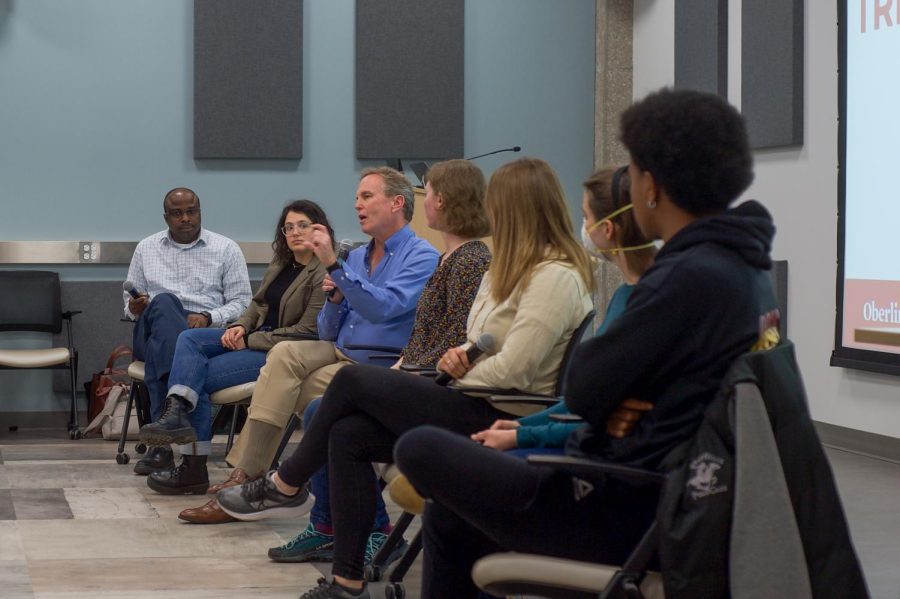ODA, Student Affairs, Senate, Counseling Center Co-Host Mental Health Forum
On Tuesday, March 28, Oberlin students, faculty, and staff gathered in Mudd Center’s Moffett Auditorium for a forum on mental health. The Office for Disability and Access organized the event in collaboration with the Division of Student Affairs, Student Senate, and the Counseling Center to open up a discussion around mental health and raise awareness about the resources available on campus.
Vice President and Dean of Students Karen Goff, one of the forum’s organizers, explained that the increased attention toward mental health on campus came after the death of Conservatory fourth-year Maura Olivero last semester. Afterward, a group of students reached out to the dean to discuss the state of mental health resources at the College. They suggested an open forum, Tuesday’s event. The forum follows last month’s general faculty workshop on the same topic.
“The goal of the event was just to bring forth the conversation so that everyone could hear each other, and students could be more aware of the resources that are available to them,” second year Fay Levin, a forum panelist and student wellness liaison for Oberlin’s Student Senate, said.
Mental health issues among Oberlin’s student body have become increasingly apparent. Last semester, there was a record number of student dropouts and emergency incompletes for mental health reasons. According to representatives at the forum, Oberlin’s Counseling and Psychological Services staff see a little over 900 students in a year — roughly one third of the total student body. This compares to an average of about 10 percent at other colleges this size. Such high demand for resources and counselors strains their availability, something students brought up at the forum. However, mental health problems are not limited to this campus.
“It’s not an Oberlin issue,” Goff said. “It really is a national issue, and other colleges and campuses are experiencing similar patterns.”
Despite their ubiquity, students often find mental health problems difficult to discuss.
“It’s a stigmatized topic,” Levin said. “It’s also a personal topic, when you don’t know what details to disclose or what you feel comfortable with.”
By opening up a space to talk, the forum aimed to address and explain the resources available to students. It began with a presentation from the Division of Student Affairs, educating students about the many support services Oberlin offers. These include programs like Well-Being Wednesdays, a BIPOC support group, and mental health round tables, which provide a space for discussions. The College’s triage program, launched this academic year, offers 20-minute initial appointments with lower wait times to make counseling more accessible. The presentation also discussed the Early Alert system, which sends weekly text alerts to students to check in on their wellness. The crux of the event, however, was not the presentation but the subsequent dialogue between panelists and attendees. The conversation got personal as many of those present, from first-year students to longtime staff members, opened up about their own struggles with mental wellness. Some students expressed frustration with aspects of the College’s support services, including their limited hours and the role of Campus Safety in answering calls for help. College first-year Lindsey Saxe attended the forum because she and her friends have struggled with mental health and with the limitations of the resources offered. She felt that the forum addressed her concerns.
“They may not have given the answers I wanted to hear, but I appreciated their transparency,” Saxe said. “Mental health care should be a priority, and in order to care for all of the students who need care, more resources need to be put into it.”
When asked how Oberlin policies and practices might change due to the discussion, Dean Goff suggested that the College might try to offer Counseling Center services beyond academic business hours. Currently, this resource is only available from 8 a.m. to 4:30 p.m. on weekdays. Additionally, both Goff and Levin said they planned to hold more forums like this one going forward.
“I think it definitely began a conversation, and it’s on the right track,” Levin said. “It can’t be a one-time thing, and I’m very happy to hear that it seems that it won’t be.”







